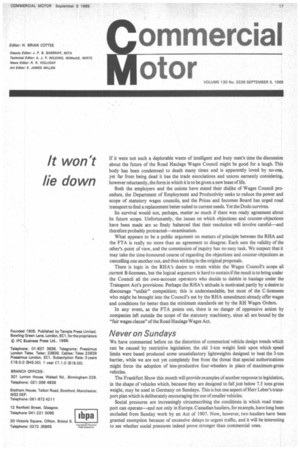It won't lie down
Page 19

If you've noticed an error in this article please click here to report it so we can fix it.
If it were not such a deplorable waste of intelligent and busy men's time the discussion about the future of the Road Haulage Wages Council might be good for a laugh. This body has been condemned to death many times and is apparently loved by no-one, yet far from being dead it has the trade associations and unions earnestly considering, however reluctantly, the form in which it is to be given a new lease of life.
Both the employers and the unions have stated their dislike of Wages Council procedure, the Department of Employment and Productivity seeks to reduce the power and scope of statutory wages councils, and the Prices and Incomes Board has urged road transport to find a replacement better suited to current needs. Yet the Dodo survives.
Its survival would not, perhaps, matter so much if there was ready agreement about its future scope. Unfortunately, the issues on which objections and counter-objections have been made are so finely balanced that their resolution will involve careful—and therefore probably protracted—examination.
What appears to be a public argument on matters of principle between the RHA and the FTA is really no more than an agreement to disagree. Each sees the validity of the other's point of view, and the commission of inquiry has no easy task. We suspect that it may take the time-honoured course of regarding the objections and counter-objections as cancelling one another out, and thus sticking to the original proposals.
There is logic in the RHA's desire to retain within the Wages Council's scope all current B-licensees, but the logical argument is hard to sustain if the result is to bring under the Council all the own-account operators who decide to dabble in haulage under the Transport Act's provisions. Perhaps the RHA's attitude is motivated partly by a desire to discourage "unfair" competition; this is understandable, but most of the C-licensees who might be brought into the Council's net by the RHA amendment already offer wages and conditions for better than the minimum standards set by the RH Wages Orders.
In any event, as the FTA points out, there is no danger of oppressive action by companies left outside the scope of the statutory machinery, since all are bound by the "fair wages clause" of the Road Haulage Wages Act.
Never on Sundays
We have commented before on the distortion of commerical vehicle design trends which can be caused by restrictive legislation; the old 3-ton weight limit upon which speed limits were based produced some unsatisfactory lightweights designed to beat the 3-ton barrier, while we are not yet completely free from the threat that special authorizations might force the adoption of less-productive four-wheelers in place of maximum-gross vehicles.
The Frankfurt Show this month will provide examples of another response to legislation, in the shape of vehicles which, because they are designed to fall just below 7.5 tons gross weight, may be used in Germany on Sundays. This is but one aspect of Herr Leber's transport plan which is deliberately encouraging the use of smaller vehicles.
Social pressures are increasingly circumscribing the conditions in which road transport can operate—and not only in Europe. Canadian hauliers, for example, have long been excluded from Sunday work by an Act of 1907. Now, however, two hauliers have been granted exemption because of excessive delays to urgent traffic, and it will be interesting to see whether social pressures indeed prove stronger than commercial ones.






















































































































